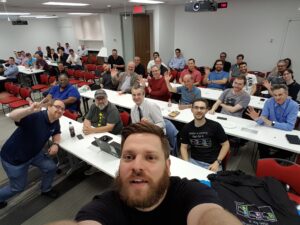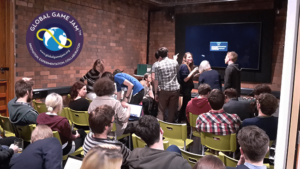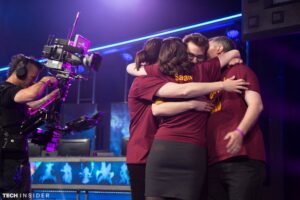To improve student success after graduation, colleges must involve students in team activities. This means moving beyond the lecture hall, classroom and library to embrace events and competitions as educational technologies. In particular, Meetups, Jams, Hackathons and eSports afford students opportunities to develop their skills and talents on many levels. In these events, students form teams with others and, by chance and sometimes by design, must use their own wits and ingenuity to adapt to challenging circumstances. Each deserves consideration when constructing New School learning environments.

Meetups
The only real difference between a college class session and a meetup is that only enrolled students attend classes. If an existing college chooses to open some class sessions to outsiders, there are powerful mechanisms available for doing so. The Meetup.com portal currently helps thousands of meetups occur each week, bringing millions together “to do, explore, teach and learn the things that help them come alive”. With some encouragement from faculty, students can attract professionals to campus by holding their own meetups. More advanced students regularly attend local meetups in their areas of interest as a matter of course. Enterprising students have found that virtually anything learned in class can be brought into sharper focus with feedback from professionals who are practicing in the field.
Treating class sessions more like meetups is also made possible as more college course materials are delivered online. The “flipped classroom”, a form of blended learning in which students prepare for class using online resources, opens up class time for questions and work on projects. This kind of “class as meetup” provides a structure in which students can form study groups to make sense of assignments from a variety of fresh perspectives.

Jams
Pickup games provide a creative outlet for athletes by simulating competitive events, without official game status. The same can be said of jams. When organized as a gathering of talent with expertise in research, writing, design, art and programming, teams can prototype remarkable products in a short period of time. In such a team setting, students participate in the entire product development process, so they are exposed to how their particular interests fit with the talents of others.
Jams feature constraints that help teams focus their efforts. A restricted period of time, from a few hours to a couple of days, intensifies the atmosphere as teams brainstorm a project, research the elements to be included, then design and prototype their entries. In order to enhance the spontaneity of the event, organizers typically withhold the theme (what is to be built) until shortly before the jam begins. Doing this in a college environment helps faculty focus attention on specific learning objectives. As an example, USV’s Global Game Jam event attracted 32 participants from industry as well as the student body. That event resulted in 8 teams producing game prototypes within a 48 hour period over a weekend.

Hackathons
Perhaps no recent pedagogical method has taken root so deeply in colleges as the hackathon. More structured than a jam, hackathons are structured in phases, with specific outcomes, judging and prizes for winners. Each phase emphasizes skills that might not be well developed by all members of a team, so they must “cut and fill” for each other, using the resources available to them at the event.
Since the purpose of the event is known in advance, some teams prepare in advance, often with hopes of recruiting the talent they need to field a winning entry. The outstanding trait of a successful team is the intensity and cohesiveness they develop as they work together toward their goal and final presentation. A balanced set of skills across the team, from pitching the project in order to attract talent, to developing the project concept, and then to producing the prototype and presenting the project to judges. Students who go from one hackathon to the next have an opportunity to refine their concepts and make major improvements with each event.
Colleges are supporting their students by recognizing hackathon projects in class. By building campus locations that feel like studios, they encourage students to experiment with ideas, pitch projects to each other and build prototypes that might be useful in competition. They know venture capitalists and hiring managers value what students build together as much as what classes they take. “Students need this kind of space all the time, not just at hackathons,” says Stacey Sickels Locke, senior director of development at the University of Maryland, which is building a lab for engineering students to experiment with virtual reality hardware and software.

eSports
Colleges from around the world are forming esports teams, in which students coordinate strategies and compete with other teams in tournaments. Students who are gamers at home can now find other gamers and compete at college. Just like basketball or football, esports has teams, leagues, championships, stars and passionate fans—plenty of them. Esports players even train like traditional athletes, logging countless hours of practice time.
While most college esports team players will never be pros, the concentration and intensity of competition helps them blow off steam. The USV esports club is one of the most popular on campus. Nearly 10% of the student body has joined it. The top players in the club compete in teams against other colleges, like Stanford, UC Berkeley and San Jose State.
By embracing team activities throughout college, students become familiar with their own strengths and appreciate their peers at a deeper level than is possible through their studies and social circles alone. Organizing team activities at this scale has never been possible before. By coordinating meetups, jams, hackathons and esports, colleges provide students with opportunities to grow and develop talents they could not have imagined before.


